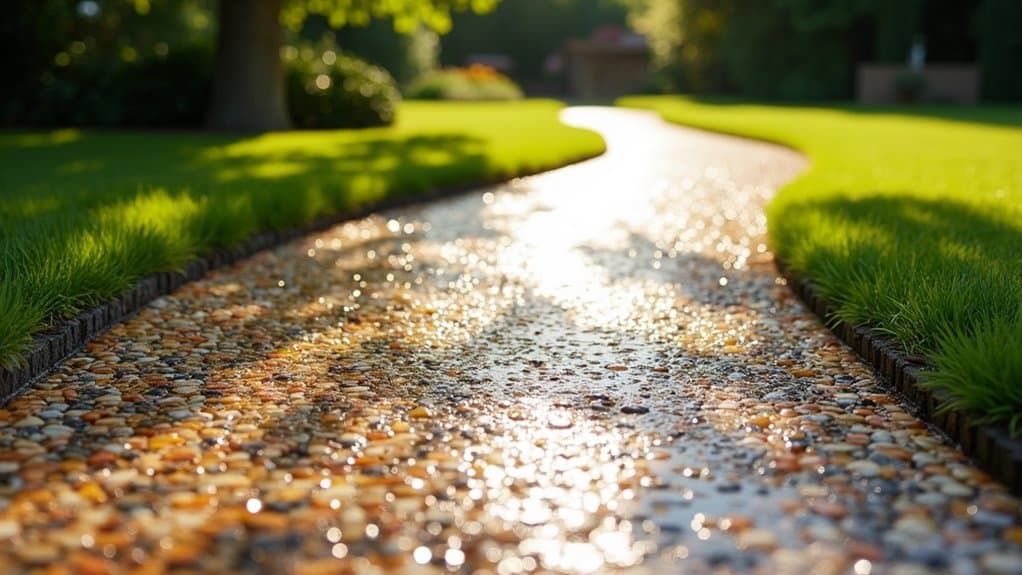Resin bound surfacing combines natural stone aggregates with clear resin to create a modern, permeable paving solution. It’s ideal for British driveways, garden paths and patios, delivering both durability and kerb appeal. The surface effectively handles our frequent UK rainfall, preventing puddles and reducing slip hazards – particularly useful during wet winters.
This eco-friendly option helps maintain local water tables and meets current planning regulations for sustainable drainage systems (SuDS). Available in various colours and finishes to complement both period properties and contemporary homes, from Yorkshire stone effects to modern slate looks.
Proper installation demands thorough groundwork and suitable weather conditions, typically requiring professional fitting for best results. A well-laid resin bound surface should last 15-20 years with minimal maintenance – simply sweep regularly and occasional power washing.
Key Takeaways
Resin bound surfacing pairs natural stone with clear resin to form tough, good-looking permeable surfaces – perfect for British driveways, garden paths and patios.
Think of it as a sponge-like surface that lets rainwater drain through naturally, helping prevent those notorious puddles and flooding we often see in UK gardens. It’s fully SUDS compliant, making it an environmentally sound choice for our climate.
You’ll find loads of colour options to match your property, from warm Cotswold stone shades to sleek modern greys. The finish looks rather like rounded pebbles set in glass, giving you both kerb appeal and practicality.
While some DIY enthusiasts might fancy having a go, it’s best left to the professionals. The process needs exact measurements and proper ground preparation – much like laying a traditional driveway, but with more precise mixing requirements.
To keep it looking smart, just give it a sweep and occasional power wash. The surface needs proper time to set (typically 24 hours), but once cured, it’s remarkably hardy against our British weather.
Definition of Resin Bound Surfacing
Resin bound surfacing creates hardwearing, attractive surfaces for driveways, paths and patios across the UK. The system blends natural stone aggregate with clear resin to form a permeable surface that effectively drains rainwater, preventing standing water and reducing slip risks. This is particularly beneficial in urban areas, as resin bound surfaces are SUDS compliant and help manage rainwater runoff. Additionally, proper installation practices ensure that the surface remains resilient to wear over time, offering long-lasting durability.
The surface combines the aesthetics of loose gravel with concrete-like durability, making it increasingly popular for both residential and commercial projects. Unlike traditional gravel, the stones stay firmly in place and won’t scatter onto lawns or pavements.
Installation requires careful attention to detail. A solid, clean base is essential, and existing or new concrete surfaces often need priming.
The resin and aggregate must be thoroughly mixed in a forced action mixer. Once poured, the surface needs swift levelling and finishing, as the resin begins to set within 10-15 minutes.
Benefits of Resin Bound Surfacing
The benefits of resin bound surfacing make it a smart choice for UK properties. Its porous nature effectively manages rainwater, preventing surface flooding and maintaining ground water levels – particularly useful for Britain’s wet climate. The surface naturally filters pollutants, contributing to a greener environment. Additionally, resin bound systems can be shaped into various designs, allowing for creative patterns that enhance aesthetic appeal. Moreover, resin bound surfaces can store up to 3,000 gallons of water under a 1,000-square-foot area, further supporting groundwater replenishment.
Built to last, resin bound surfaces require minimal upkeep compared to traditional paving options like block paving or tarmac. They withstand harsh British weather, resist weed growth, and maintain their appearance year-round. The non-slip finish provides safe footing in wet conditions, whilst its seamless look enhances kerb appeal.
From a cost perspective, resin bound surfacing proves worthwhile. It eliminates the need for additional drainage solutions common with concrete or tarmac, and its durability means fewer repairs over time.
Estate agents often note that well-installed resin driveways can boost property value, making it a sound investment for UK homeowners.
Design and Customization Options
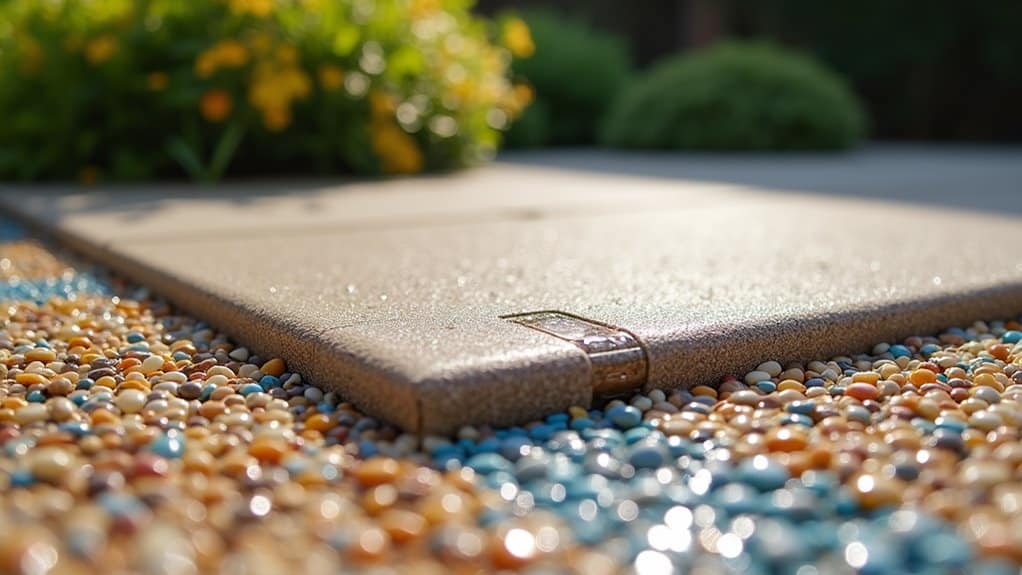
Design and customisation choices for resin bound surfaces offer extensive possibilities across the UK.
Pick from a broad range of colours, from warm sandstone to sleek slate grey, matching any garden or driveway setting.
Common patterns include circular formats for driveways, flowing curves for garden paths, and clean geometric shapes for patios.
The system proves remarkably versatile – you might fancy a traditional herringbone layout for a period property or modern straight lines for contemporary homes. Additionally, consider using PCC edging for a durable and budget-friendly solution that complements your design. Researching the available customisation options can help you make informed decisions about your paving project.
Whatever your property style, from Victorian terraces to new-builds, there’s a suitable design option.
Color Variety Choices
Colour options in resin-bound surfacing offer excellent design flexibility. Our range includes 48 distinct gravel blends with varying aggregates, sizes and textures to match any style preference.
Bold designs work well with gold or yellow aggregates mixed with reds and greens. Silver and grey options provide versatile choices that contrast nicely with traditional brickwork. For modern looks, cream and beige deliver a fresh finish, whilst pink shades like Brindle and Champagne Pink add unique character.
When selecting colours, consider how they’ll work with your existing garden or driveway. You might combine different aggregates to create custom patterns or company logos – particularly useful for commercial premises. Additionally, the DALTEX collection features various shades that can enhance your project’s visual appeal.
Worth noting: lighter colours typically need more frequent cleaning.
To enhance your design, consider adding contrasting borders using aluminium trim or granite setts. The extensive range means you can create exactly the look you want, whether for a residential driveway or commercial space.
Shape and Pattern Flexibility
Resin bound surfacing delivers exceptional versatility in shapes and patterns, making it perfect for British outdoor spaces. The system adapts brilliantly to varied terrain – whether it’s garden paths, driveways or tricky slopes. Unlike traditional block paving, it creates smooth, seamless surfaces that eliminate trip hazards.
The design possibilities are vast. You can opt for classic geometric patterns or add personalised touches like company logos and contrasting colours. Think smart house numbers on your driveway or striking border designs around your patio.
By mixing different aggregate sizes and types, you’ll achieve distinctive textures and finishes. The UV-stable resin ensures lasting durability whilst maintaining flexibility – crucial for the British climate. You can tailor the resin-to-aggregate mix to suit specific areas, such as creating a more robust blend for high-traffic zones. This adaptability also enhances water drainage, making it an ideal solution for areas requiring effective water management.
Resin bound surfacing combines practicality with aesthetics, delivering a safe, attractive finish that transforms outdoor spaces. Whether for a modest garden path or a sweeping driveway, it’s a reliable choice for modern British properties.
Installation Steps Overview
Installation Steps Overview
Essential preparation work and proper mixing form the backbone of quality resin bound surfacing. A spotless area and correctly blended resin ensure your installation stands the test of time.
Start by thoroughly cleaning the surface – sweep away debris, remove stubborn stains, and repair any cracks or damage. Think of it like painting a wall: you wouldn’t start with a dirty surface. To ensure optimal results, make sure the concrete/tarmac base is strong enough for intended use and adhered to professional standards.
For the mixing stage, precise measurements are crucial. Much like baking, where incorrect proportions can ruin a cake, the wrong resin-to-aggregate ratio will compromise your surface’s durability.
The preparation and mixing stages aren’t particularly exciting, but they’re absolutely vital. Getting these basics right will save you from costly repairs down the line.
Surface Preparation Process
Surface preparation directly impacts resin bound surfacing success. Poor preparation leads to installation problems and reduced durability.
Essential preparation steps:
| Step | Action | Purpose |
|---|---|---|
| 1. Clean the Surface | Sweep or pressure wash | Remove debris, weeds and oil |
| 2. Repair Damage | Fix potholes and cracks | Ensure level base |
| 3. Check Conditions | Confirm dry, warm weather | Support proper curing |
| 4. Mark the Area | Create a 1m² grid | Guide resin gravel application |
| 5. Prepare Tools | Use mortar-compatible drill | Ensure thorough mixing |
The base must be structurally sound for its intended use and completely dry before starting. To avoid installation issues, it is essential to ensure the base material is in good condition. Avoid installation in wet conditions, which causes delamination or foaming. Proper preparation creates a lasting, durable resin bound surface.
Mixing and Application Techniques
Mixing and application techniques are crucial for a quality resin bound surface. Use a forced-action mixer to ensure proper blending of resin and aggregate. Check your supplier’s guidelines for the correct resin-to-aggregate ratio. Additionally, it is essential to ensure that the existing surface is clean and debris-free before applying the mixture.
Mix resin and hardener first, then pour into a well made in the centre of your aggregate. Continue mixing until all stones are properly coated, with no dry patches visible.
Sort your aggregates into neat piles before starting. Your sub-base should be either open-grade tarmacadam or permeable concrete – mark it with a grid for easier application.
Keep your tools clean and ready: you’ll need a plasterer’s paddle, bucket and float.
Spread the mixture evenly at the proper depth. Level with a squeegee or shovel, and work swiftly as the resin sets within 10-30 minutes. A light water spray on your float helps with smoothing.
Trowel or roll out excess material, then leave to cure for 24 hours.
Importance of Surface Preparation
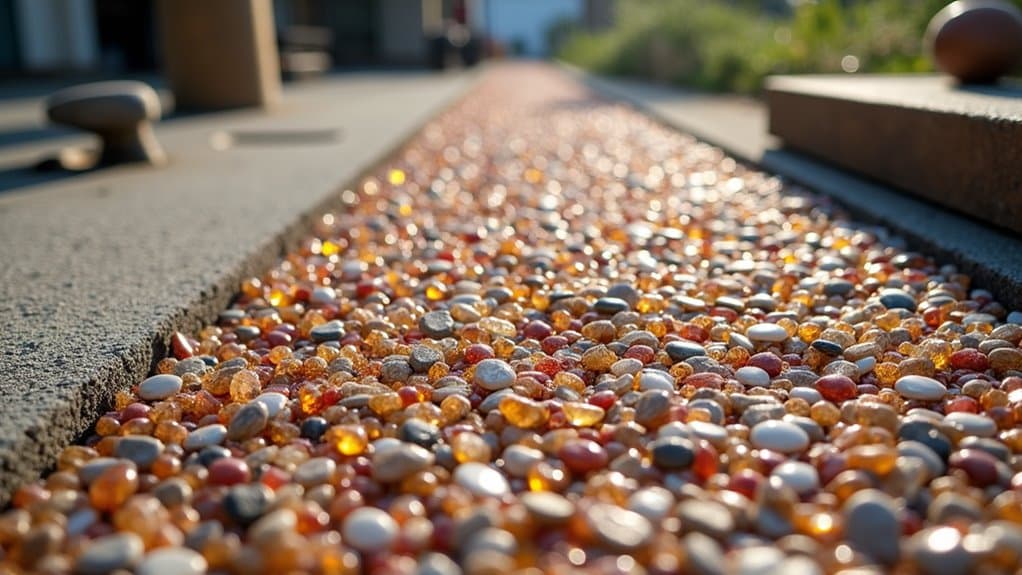
Surface preparation is crucial for ensuring resin bound surfacing lasts and performs well. Proper preparation boosts durability and cuts down on maintenance needs.
The base must be solid, stable and level. Clear away any loose material, organic matter or contaminants. For existing surfaces, a thorough sweep and pressure wash will create a clean working area.
New bases need proper drainage and must be free from oils, grease or standing water. Allow concrete to cure for at least four days, whilst asphalt should be clean and uncontaminated. It’s important to note that a well-prepared base with 100mm thickness ensures stability and strength for the driveway.
Check levels, weather and surface cleanliness before starting work. Ground temperature must be above 10°C. Apply a thin regulating course if needed, and treat concrete surfaces for laitance to ensure proper bonding.
Think of it like painting a wall – skip the prep work, and you’ll end up with peeling paint and constant touch-ups. The same principle applies here; good preparation leads to lasting results. Additionally, the base must be sound, firm, and level to support the resin-bound aggregate.
Curing Process Explained
The curing of resin bound surfaces is critical for lasting performance. Curing times fluctuate with British weather conditions – warmer days speed up the process, whilst cooler temperatures slow it down. Proper curing ensures your surface won’t just look brilliant, but will withstand daily foot traffic and our varied UK climate. Understanding the curing timeline is essential for maintenance to prevent potential issues. Think of it like setting a cake – rush the process, and you’ll end up with poor results.
During installation, it’s vital to keep foot traffic to a minimum, as walking on the surface too soon can lead to damage and compromise the integrity of the driveway surface.
Regular maintenance after curing, such as gentle cleaning and prompt stain removal, keeps your surface in top form for years to come.
Importance of Curing Time
Curing time is crucial for resin-bound surfaces to reach their full strength and durability. With UK weather being quite variable, timing your installation is key. In warm conditions, surfaces can cure within 6-12 hours, though it’s best to keep all traffic off for 24 hours to be safe. Additionally, optimal temperature conditions can significantly influence the effectiveness of the curing process.
When temperatures drop, particularly in winter, curing might take up to 48 hours, and the temperature needs to stay above 5°C for proper results. Temperature plays a major role in how quickly your surface sets. Warm ground helps speed up curing, whilst cold evenings can slow it down significantly.
Much like waiting for concrete to set, a partially cured surface can be easily damaged. To protect your investment, keep pets and people off the new surface, and put up clear signage to prevent accidental damage.
Once fully cured, sealing the surface will protect it from our British weather and UV rays, helping it last longer. Getting the curing process right is vital for a long-lasting, attractive finish.
Factors Affecting Curing Process
Factors Affecting Resin Surface Curing
Several key factors influence how resin-bound surfaces cure, directly impacting the final quality of your installation. Temperature stands as the most crucial element, with optimal curing occurring between 5°C and 25°C. Higher temperatures rush the curing process, making it difficult to trowel properly, whilst colder conditions slow it down and risk moisture damage. Additionally, it is important to maintain the ideal resin ratio of 6% to 8% for achieving durability during the curing process.
Humidity plays a vital role too—aim for 30% to 85% relative humidity for best results. Too much direct sunlight can be problematic, particularly during hot weather. Ground temperature often differs from air temperature and needs checking, as it can significantly affect curing times.
Essential Factors at a Glance:
| Factor | Ideal Condition | Impact of Deviation |
|---|---|---|
| Temperature | 5°C to 25°C | Rapid curing or softness |
| Humidity | 30% to 85% | Improper bonding |
| Sun Exposure | Indirect sunlight | Uneven curing |
| Ground Temperature | Matches air temperature | Affects curing times |
| Rain | Dry conditions | Interferes with curing |
Monitoring these conditions carefully helps ensure a properly cured, durable resin surface.
Post-Curing Surface Maintenance
Keeping your resin-bound surface in top condition requires proper post-cure maintenance. Check the surface regularly for any damage or defects and sort issues quickly to avoid costlier problems later. For day-to-day care, sweep with a stiff nylon brush – particularly important for lighter-coloured surfaces. Skip metal brushes or harsh tools that might loosen the stones. If you’re using a pressure washer, keep it at least 30cm from the surface.
For spillages, time is crucial; mop up oil with absorbent materials and tackle stubborn marks with a degreasing agent. If you’re stuck with tough stains or repairs, get a professional in. Regular cleaning is necessary, especially for lighter colors, to prevent staining and maintain aesthetic appeal. A UV-protective sealant helps shield your surface from sun damage and extends its life. Regular maintenance checks and prompt attention to problems will keep your resin-bound surface looking smart for years.
SUDS Compliance Explained
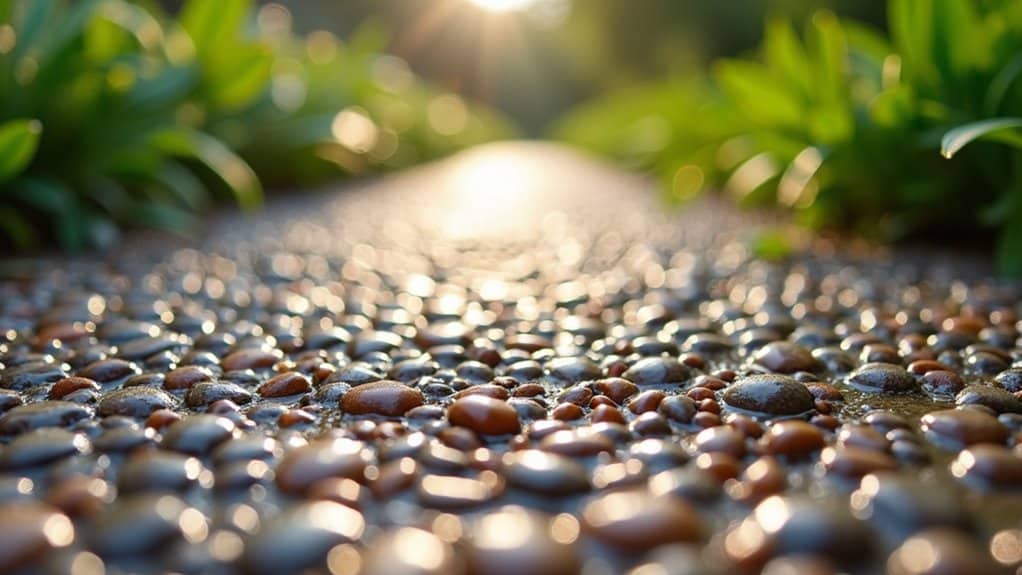
Sustainable Urban Drainage Systems (SUDS) are vital for managing surface water across UK towns and cities, where traditional drainage often struggles to cope.
These systems work like natural drainage, cutting flood risks and water pollution whilst delivering multiple benefits.
Key points for SUDS compliance:
- Permeable Surfacing: Your new or replacement driveway must use permeable materials to meet SUDS rules – otherwise you’ll need planning permission.
- Base Requirements: If you’re using resin bound paving, you’ll need a porous base such as specialist concrete or open-textured Bitmac. This ensures that the surface can be SUDS compliant and effectively manage surface water. Additionally, a solid sub-base is crucial for durable surfaces that can withstand the elements and heavy weights.
- Water Infiltration: SUDS-compliant surfaces handle massive amounts of water – up to 850 litres per square metre per minute – helping it seep naturally into the ground.
- Avoid Non-Compliant Systems: Steer clear of resin bonded systems, as they create a solid surface that blocks water penetration and won’t meet SUDS requirements.
Environmental Advantages
Environmental Advantages
Resin-bound driveways offer significant environmental benefits for your home and local area. The surface is fully permeable, letting rainwater soak through naturally rather than running off. This helps prevent local flooding and maintains healthy groundwater levels – particularly useful in British weather. The durability of resin-bound surfaces means that they are better suited to withstand harsh weather conditions, minimizing damage and prolonging their lifespan.
The surface acts as a natural filter, cleaning rainwater as it passes through and stopping pollutants from reaching streams and rivers. This reduces pressure on local drainage systems, which is especially valuable during heavy rainfall.
These driveways last remarkably long with minimal upkeep, meaning less waste and fewer replacements over time. Many UK installers now use recycled materials in their aggregate mix, supporting sustainable building practices. Additionally, the longevity of resin-bound driveways contributes to a reduction in material production and waste, which further enhances their eco-friendliness.
The manufacturing process uses less energy than traditional surfaces like tarmac or concrete, resulting in a smaller carbon footprint.
It’s a practical choice that benefits both your property and the environment.
Comparison With Other Paving Solutions
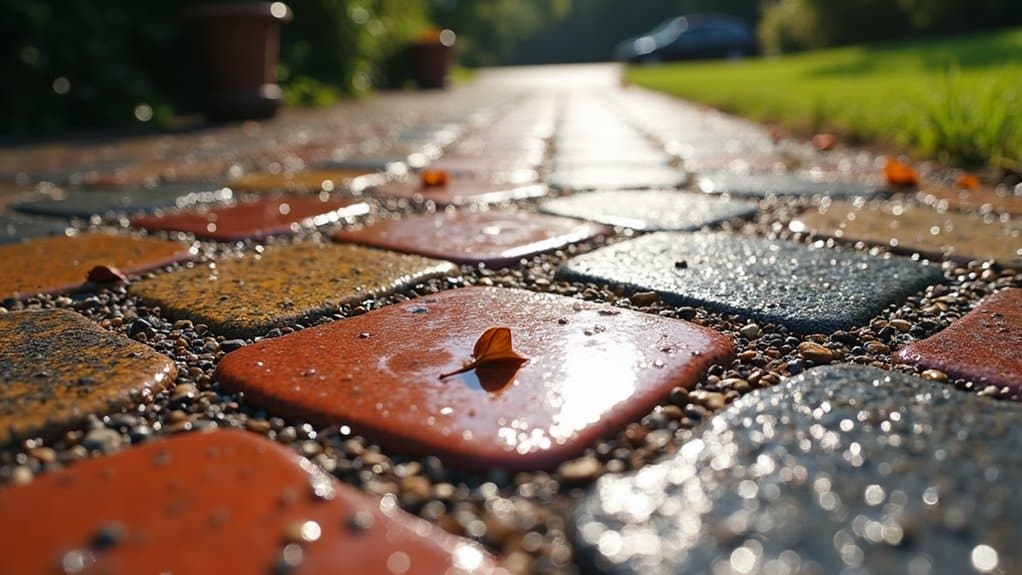
Resin bound surfacing offers distinct advantages over traditional paving options:
1. Lasting Durability: Holds up better than standard block paving, with excellent resistance to British weather conditions, maintaining colour and structural integrity longer.
2. Value for Money: Initial costs match block paving, but fewer long-term expenses – no need for resealing or frequent repairs common with traditional surfaces.
3. Low Maintenance: Just needs occasional brushing and pressure washing.
Perfect for busy households who’d rather not spend weekends maintaining their driveway.
4. Enhanced Safety: Non-slip surface and smooth finish means fewer trip hazards – ideal for families with young children or elderly visitors. Additionally, resin’s UV stability prevents fading, ensuring your driveway retains its vibrant colors over time.
Aesthetic Appeal and Options
Resin bound surfacing transforms ordinary outdoor spaces into striking features. The range of colours and textures available means you can match current design trends whilst maintaining practicality. From smooth to textured finishes, these surfaces make a genuine visual impact.
The design options are practical and versatile. You can opt for simple geometric patterns or create bespoke designs that incorporate company branding. Natural patterns work particularly well in garden settings, whilst modern designs suit commercial spaces. The highly resistant nature of resin bound surfacing ensures that these designs maintain their aesthetic appeal over time. Additionally, the inclusion of permeable surfaces allows for enhanced drainage and minimizes puddling, making them a smart choice for all outdoor environments.
The seamless finish looks smart and professional, working well with various landscapes and property styles. Different edging choices help define spaces clearly, and the range of aggregate options means you can achieve precisely the look you want.
These surfaces offer the perfect balance of aesthetics and function, ideal for both residential driveways and commercial spaces across the UK. The finished result is smart, durable, and distinctly British in its understated elegance.
Common Applications and Uses
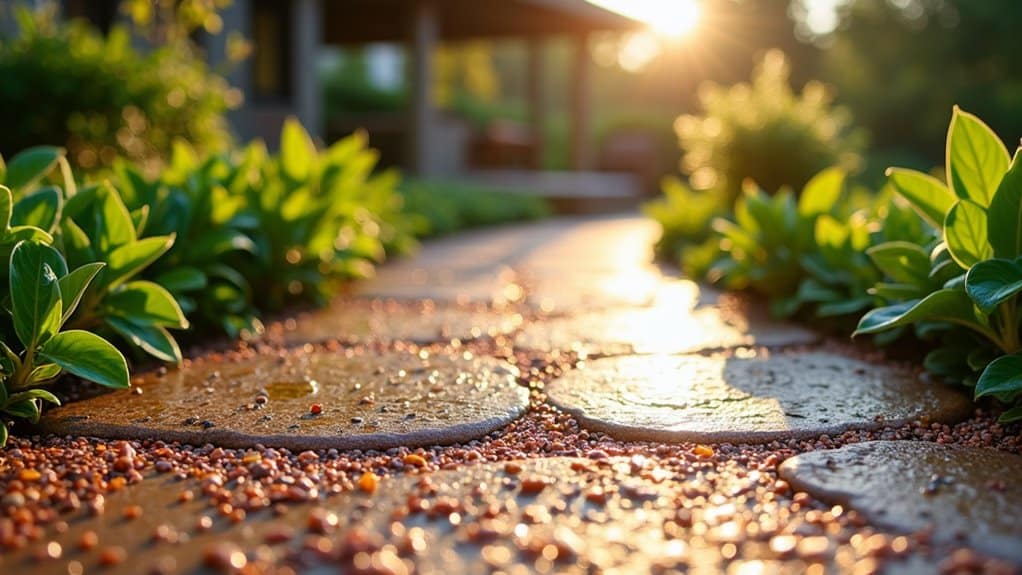
Common Applications and Uses
Resin bound surfacing transforms outdoor spaces across UK residential and commercial properties. The versatility makes it practical for multiple uses:
Gardens and Parks
Smooth, durable pathways that complement natural landscaping whilst handling heavy foot traffic. Safe surfaces for school playgrounds enhance the usability of these areas for children.
Patios and Outdoor Living
Low-maintenance surfaces ideal for British weather, perfect for garden furniture and BBQ areas.
Pool Surrounds
Non-slip, weather-resistant surfaces that work brilliantly around swimming pools and water features.
Driveways
Sturdy surfacing that withstands cars and daily vehicle movement, whilst maintaining kerb appeal.
Installation requires careful planning to avoid common pitfalls.
Though initial costs can be steep, the durability and minimal upkeep often prove cost-effective for UK property owners.
Consider your specific requirements and budget when choosing where to apply this surfacing solution.
Frequently Asked Questions
How Long Does Resin Bound Surfacing Last?
Resin bound surfacing lasts between 15-25 years when properly installed and maintained. Using premium-grade materials and carrying out regular upkeep, such as routine cleaning and addressing any small repairs promptly, maximises the surface’s durability. Think of it like a car’s paintwork – the better you look after it, the longer it maintains its quality and appearance.
Can Resin Bound Surfacing Be Repaired if Damaged?
Yes, resin bound surfacing can be repaired. Small cracks and chips can be patched with matching resin mix, whilst larger damaged areas may need section replacement or overlaying. Common repairs include fixing loose stones, filling holes and addressing surface wear – much like repairing a damaged patio. Most repairs blend seamlessly when done properly by a qualified contractor.
Is Resin Bound Surfacing Suitable for All Climates?
Resin-bound surfacing performs well in the British climate, from rainy winters in Scotland to warmer southern summers. When properly installed by qualified contractors, the surface withstands frost, heavy rain and temperature changes typical across the UK. The UV-stable resins and aggregates maintain their appearance without fading or deteriorating, making it a practical choice for driveways, paths and patios nationwide.
How Does Resin Bound Surfacing Perform in Winter Conditions?
Resin bound surfaces perform remarkably well during British winters, offering excellent frost resistance and grip. The permeable nature allows rainwater and melting snow to drain quickly, significantly reducing ice formation and the need for gritting. This makes it particularly practical for driveways, paths and public spaces across the UK’s cold season.
What Maintenance Is Required for Resin Bound Surfacing?
Regular sweeping and occasional cleaning with mild soap keeps resin bound surfaces in top condition. For best results, use a stiff brush and standard household cleaner – just like you’d clean your patio. Tackle any spills straight away, particularly oil or red wine, to prevent permanent marks. A quick blast with the pressure washer once or twice a year should shift stubborn dirt, though keep the pressure moderate to protect the surface.
Conclusion
Resin bound surfacing offers a practical and attractive solution for UK properties. This permeable paving system combines stone aggregate with clear resin to create durable surfaces for driveways, paths and patios. Perfect for Britain’s rainy climate, it allows water to drain naturally, helping prevent flooding and puddles. The finish looks smart on both modern and traditional homes, with colour options from classic Somerset buff to contemporary slate grey. Unlike traditional block paving or tarmac, resin bound surfaces require minimal maintenance and resist common issues like weed growth and frost damage.
